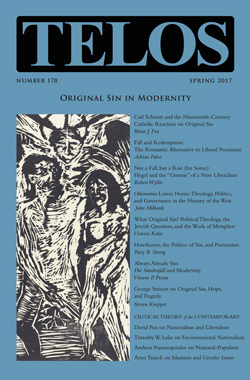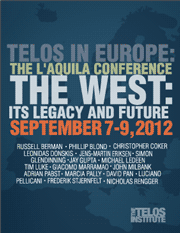By Russell A. Berman · Friday, March 12, 2021 To read more in depth from Telos, subscribe to the journal here.
Former President of the German Bundestag Wolfgang Thierse mounts a powerful argument against identity politics in Germany and their political consequences. His comments here and originally here have elicited a robust discussion in Germany, especially because the current leaders of the Social Democratic Party (SPD), of which Thierse is a long-term member, reportedly responded that they felt ashamed at his “regressive” views. While the leadership represents the current left wing of the party, other voices from the center rallied to Thierse’s defense. At stake is the gap between alternative aspirations within this venerable party, once the foundational political organization of the German left with roots in the workers’ movement of the nineteenth century.
Continue reading →
By Telos Press · Thursday, January 21, 2021 In today’s episode of the Telos Press Podcast, Camelia Raghinaru talks with Menachem Fisch about his article “The Tragic Paradox of Political Zionism,” from Telos 192 (Fall 2020). An excerpt of the article appears here. If your university has an online subscription to Telos, you can read the full article at the Telos Online website. For non-subscribers, learn how your university can begin a subscription to Telos at our library recommendation page. Purchase a print copy of Telos 192 in our online store.
Listen to the podcast here.
Continue reading →
By Russell A. Berman · Wednesday, November 11, 2020 The President of France, Emmanuel Macron, delivered this speech on September 4, 2020. I discussed it in a TelosScope post here, putting it in dialogue with President Trump’s Mount Rushmore speech of July 4. There has been interest on the part of some readers in a full translation of Macron’s text, so it is offered below.
The context: Macron is welcoming a group of newly naturalized citizens into the national community. Hence his double agenda: on the one hand, highlighting the diversity of France as an immigrant nation, while on the other insisting on the unity of French history, culture, language, and above all the Republic. This is a speech about the Republican values that Macron expects all French citizens to share and, what’s more, to uphold actively and vigorously. “Liberty, Equality, Fraternity” have a standing in French political culture similar to “life, liberty, and the pursuit of happiness” from the American Declaration of Independence.
Continue reading →
By Russell A. Berman · Monday, April 3, 2017 In addition to its main focus on original sin in modernity, Telos 178 (Spring 2017) features a special section of topical writing, introduced here by Russell A. Berman, that continues our ongoing commitment to setting forth a critical theory of the contemporary. Telos 178 is now available for purchase in our store.
 Not that long ago, debates over politics were anchored in a clear opposition between universalism and relativism. Proponents of an inclusive structure of, at least aspirationally, all states—the new world order—envisioned an unchallenged entrenchment of democratic capitalism everywhere. Where dictatorships endured, as in North Korea, they were treated as bizarre outliers, exceptions that proved the rule of the progress of mankind toward Kant’s perpetual peace. Universalist values held sway; ultimately all rights were to become human rights, due to all humans solely on the basis of their humanity, implying that rights pursuant to national citizenship, to membership in any particular national community, would dwindle in significance: no borders, no sovereignty, no traditions. However this conceptual expression of globalization faced sophisticated critics, variously postmodern, which treated that universalism with disdain and suspicion, insinuating to it an imperial agenda and offering an alternative program of multiplicity, diversity, and multipolarity. That was the historical moment of the theoretical opposition between Habermas and Derrida, the universality of communicative reason versus the insistence on difference. Inclusion and integration stood opposed to multiculturalism, as did generally applicable norms to the particular claims of local culture and tradition. Not that long ago, debates over politics were anchored in a clear opposition between universalism and relativism. Proponents of an inclusive structure of, at least aspirationally, all states—the new world order—envisioned an unchallenged entrenchment of democratic capitalism everywhere. Where dictatorships endured, as in North Korea, they were treated as bizarre outliers, exceptions that proved the rule of the progress of mankind toward Kant’s perpetual peace. Universalist values held sway; ultimately all rights were to become human rights, due to all humans solely on the basis of their humanity, implying that rights pursuant to national citizenship, to membership in any particular national community, would dwindle in significance: no borders, no sovereignty, no traditions. However this conceptual expression of globalization faced sophisticated critics, variously postmodern, which treated that universalism with disdain and suspicion, insinuating to it an imperial agenda and offering an alternative program of multiplicity, diversity, and multipolarity. That was the historical moment of the theoretical opposition between Habermas and Derrida, the universality of communicative reason versus the insistence on difference. Inclusion and integration stood opposed to multiculturalism, as did generally applicable norms to the particular claims of local culture and tradition.
Continue reading →
By Chantal Bax · Monday, January 14, 2013 The following paper was presented at Telos in Europe: The L’Aquila Conference, held on September 7-9, 2012, in L’Aquila, Italy.
 Should national identity be considered to be an outdated concept in this day and age? Have the adjectives “French,” “Italian,” “German,” and so on become meaningless terms over the last couple of decades? Both practical and theoretical developments may seem to suggest that this question should be answered in the affirmative. Processes of globalization, including increased mobility and migration, have made it unmistakably clear that the human world cannot be divided into discrete social units. In addition, much philosophical effort has been devoted to destabilizing notions like “community,” “sameness,” and “identity.” Should national identity be considered to be an outdated concept in this day and age? Have the adjectives “French,” “Italian,” “German,” and so on become meaningless terms over the last couple of decades? Both practical and theoretical developments may seem to suggest that this question should be answered in the affirmative. Processes of globalization, including increased mobility and migration, have made it unmistakably clear that the human world cannot be divided into discrete social units. In addition, much philosophical effort has been devoted to destabilizing notions like “community,” “sameness,” and “identity.”
Continue reading →
|
|

 Should national identity be considered to be an outdated concept in this day and age? Have the adjectives “French,” “Italian,” “German,” and so on become meaningless terms over the last couple of decades? Both practical and theoretical developments may seem to suggest that this question should be answered in the affirmative. Processes of globalization, including increased mobility and migration, have made it unmistakably clear that the human world cannot be divided into discrete social units. In addition, much philosophical effort has been devoted to destabilizing notions like “community,” “sameness,” and “identity.”
Should national identity be considered to be an outdated concept in this day and age? Have the adjectives “French,” “Italian,” “German,” and so on become meaningless terms over the last couple of decades? Both practical and theoretical developments may seem to suggest that this question should be answered in the affirmative. Processes of globalization, including increased mobility and migration, have made it unmistakably clear that the human world cannot be divided into discrete social units. In addition, much philosophical effort has been devoted to destabilizing notions like “community,” “sameness,” and “identity.” 






